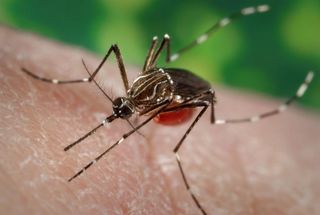Florida Man First to Get Chikungunya in the US

A Florida man may be the first person to become infected with the mosquito-borne virus chikungunya within the United States, researchers at the Centers for Disease Control and Prevention announced today (July 17).
The virus, which causes debilitating fever and severe joint pain, has been circulating in the Caribbean for the past few months, resulting in several thousands of infections. There have been cases of infection in people in the United States, but until today, all of them were reported in people who had acquired the virus during travels abroad.
"The arrival of chikungunya virus, first in the tropical Americas and now in the United States, underscores the risks posed by this and other exotic pathogens," Roger Nasci, chief of the CDC’s Arboviral Diseases Branch, said in a statement. [7 Devastating Infectious Diseases]
The CDC and Florida health officials said they are investigating how the patient contracted the virus, and are also looking out for additional, locally acquired U.S. cases.
It has been only seven months since the virus, once confined to Africa and Asia, was brought to the Western Hemisphere. It first appeared on the Caribbean island of St. Martin, likely carried there by an infected traveler. From there, the virus spread to 23 countries before arriving in the United States.
So far this year, 243 cases of infection with chikungunya have been reported in 31 states, with all patients having contracted the virus abroad. On May 30, the Puerto Rico Department of Health reported its first case of locally transmitted chikungunya.
Now, the newest reported case in Florida represents the first time that mosquitoes in the continental United States are thought to have spread the virus to a person who wasn't infected abroad.
Sign up for the Live Science daily newsletter now
Get the world’s most fascinating discoveries delivered straight to your inbox.
Chikungunya virus is transmitted to people by two species of mosquitoes, Aedes aegypti and Aedes albopictus. These mosquitos are found in many parts of the United States, including the East Coast, parts of the southwest and the lower Midwest, according to the CDC. The mosquitoes spread chikungunya by biting someone who has the virus, then biting other people.
It is not known what course chikungunya will now take in the United States. CDC officials said they believe chikungunya will behave similarly to dengue virus, where the virus, which was imported by travelers, resulted in sporadic local transmission but did not cause widespread outbreaks. However, more chikungunya-infected travelers coming into the United States increases the likelihood that local chikungunya transmission will occur, they said.
There is no vaccine to prevent or medicine to treat chikungunya virus. People can avoid contracting the virus by covering their skin and using mosquito repellents.
People infected with chikungunya virus often develop fever and joint pain, and may have other symptoms too, including muscle aches, headaches, joint swelling or a rash. Although most people recover in about a week, and infection with chikungunya virus has rarely been fatal, some people may experience joint pain that lasts months or even years, according to the World Health Organization.
Email Bahar Gholipour. Follow Live Science @livescience, Facebook & Google+. Originally published on Live Science.

Most Popular


